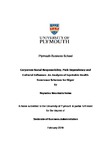Corporate Social Responsibility, Path Dependency and Cultural Influence: An Analysis of Equitable Health Insurance Schemes for Niger
| dc.contributor.supervisor | Howell, Kerry E | |
| dc.contributor.author | Mounkaila Noma, Reynatou | |
| dc.contributor.other | Plymouth Business School | en_US |
| dc.date.accessioned | 2019-04-05T08:18:43Z | |
| dc.date.issued | 2019 | |
| dc.identifier | 10446521 | en_US |
| dc.identifier.uri | http://hdl.handle.net/10026.1/13666 | |
| dc.description.abstract |
Health care is essential for the wellbeing of people and the development of a country. Populations in developing countries tend to encounter challenges in accessing good healthcare which could however be improved with health insurance. This thesis investigates the reasons for the low health coverage in Niger, in the perspective of proposing equitable schemes for attaining universal coverage. The study sheds light on the low rate of health insurance coverage in the country, as at least 70 % of the population, essentially from the informal sector does not have sustainable health insurance plan. For this study, the theoretical framework of CSR, culture and path dependency of healthcare policies informed about the role of these three concepts in the development of health insurance in Niger. Critical ethnography used as the theoretical methodology enabled a close look at the explaining factors for the low coverage. Moreover, the triangulation of data collection including interviews, focus groups and questionnaires generated in depth results useful to address the research question. The analysis of the data involved a triangulation with thematic, discourse and comparison analysis for the qualitative data; while some of the quantitative data involved statistical analysis. Three prominent themes emerged from the analysis of focus groups and interviews. The theme structure of health insurance concerned the different institutions providing health insurance and their level of financial contributions to health expenditure. The theme consumption of health insurance referred to the different groups of the population and their consumption of health insurance. Results confirmed the literature as the informal sector is the largest uninsured segment in Niger. The study made a distinctive contribution by showing the impact of CSR, culture and path dependency of policies in the development of health insurance. Through praxis by combining literature and the research findings, recommendations have been made for an equitable health coverage. A mix of mechanisms for financing health insurance seems necessary to address the lack of financial resources. Then, it is important to develop health coverage for the informal sector by addressing the barriers of culture and education. Private insurance, which only covers 3% of the population, would need to extend its market through corporate social responsibility. The extension of public insurance would require a reform of policies, which would favour the development of health insurance for the informal sector. The proposed mechanisms of basket fund raising and exchange of services in particular are likely to increase the number of uninsured people from the poor segments. | en_US |
| dc.language.iso | en | |
| dc.publisher | University of Plymouth | |
| dc.rights | Attribution-NonCommercial-NoDerivs 3.0 United States | * |
| dc.rights.uri | http://creativecommons.org/licenses/by-nc-nd/3.0/us/ | * |
| dc.subject | CSR - path dependency, culture and health insurance | en_US |
| dc.subject | Universal health coverage | en_US |
| dc.subject | Health insurance, development of in Niger | en_US |
| dc.subject | CSR (Corporate Social Responsibility) | |
| dc.subject | Path dependency and culture | |
| dc.subject.classification | Other (e.g., MD, EdD, DBA, DClinPsy) | en_US |
| dc.title | Corporate Social Responsibility, Path Dependency and Cultural Influence: An Analysis of Equitable Health Insurance Schemes for Niger | en_US |
| dc.type | Thesis | |
| plymouth.version | publishable | en_US |
| dc.identifier.doi | http://dx.doi.org/10.24382/364 | |
| dc.identifier.doi | http://dx.doi.org/10.24382/364 | |
| dc.rights.embargodate | 2019-10-05T08:18:43Z | |
| dc.rights.embargoperiod | 6 months | en_US |
| dc.type.qualification | Doctorate | en_US |
| rioxxterms.version | NA |
Files in this item
This item appears in the following Collection(s)
-
01 Research Theses Main Collection
Research Theses Main



